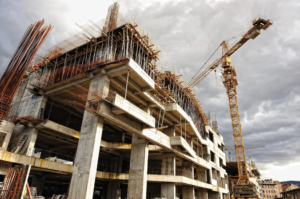The commercial real estate (CRE) market plays an important role in the overall American economy. For businesses looking to lease office space or storefronts, commercial real estate prices and availability impact everything from where the company establishes its headquarters to the length of employees’ commutes, and the kind of transportation they take to reach the office or other job site. For businesses and entrepreneurs more interested in commercial real estate development, the CRE market can offer exciting opportunities for growth – but it is not without its pitfalls. Whether you are considering your first commercial real estate development project or preparing for your next venture, consider reaching out to an experienced Arizona business law attorney attuned to the unique needs of CRE to ensure the process runs smoothly. Call (480) 320-2310 today to schedule a meeting with a member of our team.

What Is Development in CRE?
Although there may be exceptions, in the context of commercial real estate “development” usually refers to the undertaking of new construction, most commonly with the end goal of leasing the developed property, or units within the developed property. In some cases condominiums may fall under the broad heading of commercial real estate development, but the “commercial” is more often applied to the development of a property that will then be used for the conduct of tenants’ businesses. Typical examples include office buildings, industrial complexes, and storefronts, especially when organized in a strip mall or planned neighborhood arrangement.
Commercial real estate involves a number of considerations not normally present in home building, and commercial landlord-tenant agreements also differ sharply from those between residential property owners and the individuals and families who rent housing from them. In addition, commercial real estate development frequently occurs at a scale that demands substantial investment capital, and the multifarious uses to which land developed for commercial property may be put can sometimes require additional regulatory steps that might not be necessary for construction of even a multi-family residential dwelling.
Common Legal Questions in Commercial Real Estate Development
A commercial real estate developer may face a number of legal challenges, depending on the type of development, the intended end-use of the property, and the regulatory environment in which the development takes place. While a simple overview cannot hope to cover all of the possible eventualities a developer may encounter, becoming familiar with a few of the most common legal questions in commercial real estate development can lay the groundwork for making strategic decisions early in the process.
Zoning Requirements
- 9-462.01 Ariz. Rev. Stat. (2023) specifies that authority for most zoning lies with municipal governments. Reviewing local zoning regulations should begin as early as possible – before choosing the land for a new development, if possible. Even if the property is being redeveloped (via complete or partial demolition prior to new construction), a commercial real estate developer will want to ensure that they have a thorough understanding of all local zoning laws and how these might affect not only the immediate project goals but the potential for future resale and how local regulations might influence the development of nearby properties. A commercial real estate attorney can in many cases assist clients by performing a thorough review of the zoning restrictions that apply to properties under consideration, This analysis can help prospective developers to avoid costly mistakes while capitalizing on the most promising opportunities.
Environmental Considerations
States, counties, and municipalities may all impose requirements on commercial real estate developments to address potential ecological concerns or to avoid misappropriation of shared resources, such as water from a limited local supply. Some types of commercial real estate developments may not be able to move forward without approval from the United States Environmental Protection Agency (EPA). Additionally, developments of some types and in some regions may be subject to regular compliance reviews to ensure the property is meeting federal and local environmental requirements, and CRE development projects in Arizona will need to ensure they pass muster with the Air Pollution Control guidelines set out in the Arizona Administrative Code.
The environmental concerns addressed can vary depending on the local landscape and whether the tract of land was previously under development, as different requirements may apply to land that is being cleared for development for the first time as compared to areas that have already seen some construction. Harrison Law, PLLC has extensive experience helping commercial real estate developers ensure that their new projects and existing properties demonstrate compliance with the various regulations designed to protect Arizona’s eco-systems. In some cases, a seasoned commercial development attorney may even be able to steer a client toward programs that offer financial incentives for making energy-efficient, environmentally-friendly choices as they plan a new development.
Commercial Lease Agreements
While the layperson may be surprised to think that lease agreements must be considered before a property is even developed, the reality is that many projects in commercial real estate are undertaken with the end goal of leasing the property to other businesses. Decisions made in the land purchase and property development phases will inevitably have impacts on the types of leases appropriate to the property and how easy or difficult it will be to find long-term tenants to occupy the units.
Consulting with a business law attorney with contract negotiation experience may help developers to consider such questions as whether they wish to work with a property management firm, as described in § 32-2173 Ariz. Rev. Stat. (2023), or manage the property and deal directly with tenants themselves. Thoughtful discussions with an Arizona attorney can also help developers in the state evaluate how considerations such as local zoning laws may affect the range of commercial tenants eligible to lease the property, or for whom the new development will be appropriate. While long-term leases are standard fare in commercial real estate, in some cases it may also be valuable to consider whether and under what circumstances a property might be sold – including whether the property should be tenanted or untenanted when it changes hands.
Speak With an Arizona Business Law Attorney Today
The past few years have seen remarkable shifts in commercial real estate development, with an emphasis on “walkable” semi-outdoor retail and uncertainty in the office space market. There has also been a broad trend among state and local authorities toward incentivizing developments that adopt “greener” construction practices or promise to prioritize commercial tenants who will offer local workers competitive wages – measures that seek to “embed” the development as a valuable element in its surrounding community. To discuss opportunities in Arizona commercial real estate development in greater detail, consider reaching out to an experienced business law attorney with Harrison Law, PLLC. Speak with a member of our team today by calling (480) 320-2310 to schedule your consultation.
© 2024 Matthew W. Harrison and Harrison Law, PLLC All Rights Reserved This website and article have been prepared by Harrison Law, PLLC for informational purposes only and does not, and is not intended to, constitute legal or financial advice. The information is not provided in the course of an attorney-client relationship and is not intended to substitute for legal advice from an attorney licensed in your jurisdiction.





